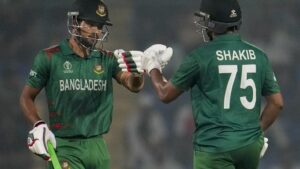
In a game marked by controversy, Bangladesh secured a three-wicket victory over Sri Lanka, eliminating the 1996 world champions from semi-final contention. Bangladesh’s captain, Shakib Al Hasan, played a pivotal role with both bat and ball, scoring 82 runs and taking 2 wickets for 57 runs to lead his team to only their second win of the competition.
This win kept Bangladesh’s hopes of qualifying for the 2025 Champions Trophy alive. The match saw a record partnership for the third wicket between Shakib and Najmul Hossain Shanto, his deputy, which enabled Bangladesh to successfully chase down the target of 280 in Delhi.
Despite a late flurry of wickets, Bangladesh managed to secure the victory, after enduring six consecutive losses. The chase began with Dilshan Madushanka removing opener Tanzid Hasan early, but Bangladesh regrouped as Shakib and Shanto put up a century stand for the third wicket.
Shakib and Shanto’s partnership of 169 runs off 149 balls was Bangladesh’s highest World Cup partnership for the third wicket. Despite the late wickets that fell towards the end of the match, the left-handed duo’s performance made the win fairly comfortable.
The game was not without drama and heated arguments, with some confrontations and send-offs, following an earlier controversial incident when Angelo Mathews was “timed out”.
Batting first, Sri Lanka’s opening partnership struggles persisted as Kusal Perera replaced Dimuth Karunaratne but experienced a familiar failure to launch. Pathum Nissanka found himself in partnership with Kusal Mendis, the skipper, and tasked with rebuilding the innings. Nissanka played exquisite strokes, while Mendis struggled at the other end. Sri Lanka reached 52-1 by the end of the first powerplay. The duo of Nissanka and Mendis managed to put together a 61-run partnership for the second wicket, but Mendis fell for 19 in the 12th over to a loose shot.
In the very next over, Tanzim Hasan Sakib, making his World Cup debut, dismissed Nissanka for 41. Sadeera Samarawickrama and Charith Asalanka added 63 for the fourth wicket, before Samarawickrama carelessly lost his wicket for 41.
However, the most remarkable moment of the match was Mathews’ historic dismissal. He became the first batter in the history of international cricket to be “timed out”. Mathews walked out to bat but found that his helmet strap had come undone just as he was about to take guard. He called for a replacement helmet, which took some time to arrive. It was then that Shakib unexpectedly appealed for the timed-out decision.
According to the MCC rules, an incoming batter must be prepared to face a ball within three minutes of a dismissal. However, according to the ICC’s playing conditions, a batter has just 120 seconds to take guard. Mathews did exit the dressing room within the stipulated time frame. However, his readiness was delayed because of the helmet strap issue, leading to a controversial appeal from Bangladesh. Despite Mathews’ frustration and argument, Shakib maintained the appeal. The umpires upheld Bangladesh’s appeal, sparking debates both on and off the field.
This incident seemed to galvanize Sri Lanka, inspiring them to regain momentum. Mathews’ departure was followed by an exceptional performance from Asalanka. He batted with exceptional control and precision, contributing significantly to his team’s recovery. Asalanka’s splendid knock of 108 came off 104 deliveries and included 6 fours and 5 sixes. With valuable contributions from Dhananjaya de Silva and Maheesh Theekshana, Sri Lanka managed to post a total of 279 runs.
It wasn’t enough, though Bangladesh’s chase, punctuated by moments of bad blood, couldn’t quite gloss over the drama that had gone before.




